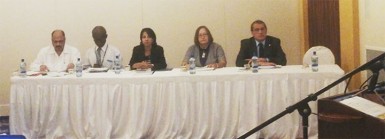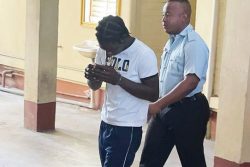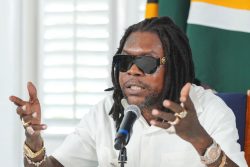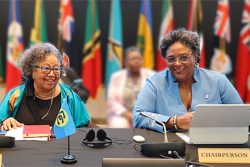The number of people with disabilities in Guyana this year is projected to be some 200,000 and this figure includes those who are institutionalized, living on the streets and those who are temporarily disabled, Director of Rehabilitation Services (ag) Debita Harripersaud said yesterday when the National Rehabilitation Services Strategic Plan 2014 – 2020 was launched at the Pegasus Hotel.
Harripersaud said the figure was first set at 50,000 and this was extrapolated from the 2002 population census, but then it was recognised that the census did not take certain categories of disabled people into consideration. The 2002 census set Guyana’s population at 751,223. Another census was since conducted in 2012 but to date only preliminary results have been released.
The launch was held under the theme: ‘Towards Improved Health, Partnerships and Inclusiveness for all Persons with Disabilities,’ and Harripersaud noted that the socio-economic profile of a person with disability was: poor, elderly, uneducated and unemployed. She opined that there still exists a vicious cycle of poverty and disability.
Prevalence of disability was growing, she noted, mainly as a consequence of motor vehicle accidents, mental health, violence in the community and the rise of chronic health conditions. “It is evident that there is going to be a significant increase in the need for disability and rehabilitation services in Guyana,” she stated.

Disability and rehabilitation services are delivered through seven programmes administered by the Ministry of Health through the public hospitals including physiotherapy, occupational therapy, speech and language therapy and audiology. In addition, supportive services are provided through the Open Doors Centre, the Cheshire Home and the Ptolemy Reid Rehabilitation Centre.
The three main strategic objectives outlined in the strategic plan are advancing the well-being of all persons with disability (PWD) Guyana, reducing health inequities of PWD and strengthening the capacity of the health system to deliver quality, effective and responsive disability and rehabilitation services.
Over the period to 2020, it is envisioned that the National Rehabilitation Services Strategy (NRSS) will organize its resources to mitigate institutional systemic organizational, cultural, social, financial and informational barriers that PWD in Guyana face in accessing health care.
The plan has defined four strategic components containing nine priority areas within which the three abovementioned strategic objectives will be actioned.
The strategic components are to strengthen the health system for disability and rehabilitation services, improve accessibility, promote prevention and minimize and prevent further disabilities.
Health Minister Dr Bheri Ramsaran, began his feature address, with what he said was “an admission”, that, “two aspects of health care in Guyana are relatively on the back burner.” And he indicated that they were mental health and disabilities and rehabilitation medicine.
He said that although professionals in those areas have given lots of attention, in an effort to improve the situation, because of stigma, “these two aspects of our health care system need some more work, a lot more work.”
While relating his pleasure at the production of the NRSS, he said there was need for more than a strategy. The things that would make that strategy a living one were necessary.
He highlighted the fact that the University of Guyana now offers a Bachelor’s degree programme in Medical Rehabilitation and according to the NRSS 2014-2020, this year’s first batch of three graduates specialized in physiotherapy.
Ramsaran said the training and retention of graduates must be addressed, owing to the fact that the sector has to rely on a small corps of foreign professionals in the rehabilitation services area.
He also recognized the role of strategic partners such as PAHO, in sourcing support, including for the creation of the programme at the University of Guyana.
Ramsaran charged the Rehabilitation Services department to hold discussions to look at the challenges that will arise during the course of the strategy, as he noted that his ministry, at the highest level has representation in organizations created especially to address concerns of the PWD, which he opined tends to be marginalized.
PAHO/WHO Representative Dr William Adu-Krow noted that the prevalence of disability is growing and is higher in low income countries. “It is a problem for all of us to contend with,” he said.
Also speaking at the event was Regional Advisor of Disability and Rehabilitation, Latin America and Caribbean PAHO/WHO, Dr Armando Vasquez, who lauded the strategy.









